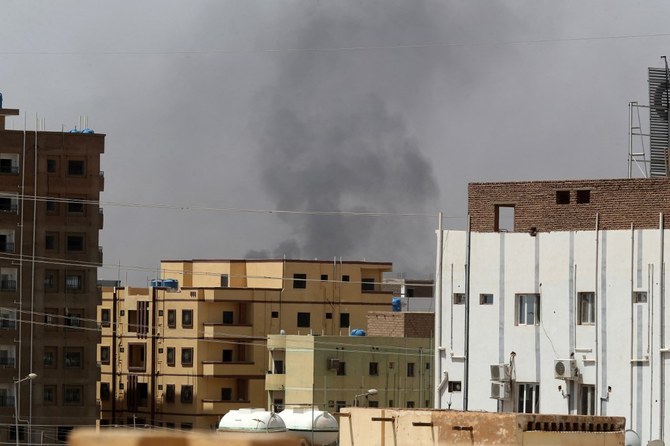LONDON: The UK’s decision to “turn its back” on Sudan could create a dangerous precedent that sees the rights of refugees “lost to history,” a refugee charity has warned.
Urging the British government to reverse course and create a new visa system to assist those fleeing violence in Sudan in the same way it has done for Ukrainians, Choose Love’s Deputy CEO Emma Stevenson told Arab News that the charity has a “simple” request of the UK: “Don’t turn your back on people seeking safety.”
She added: “Even if just a few countries follow the UK government’s lead and deny asylum to those fleeing conflict and persecution, the rights of refugees and the fundamental legal right to claim asylum could be lost to history.”
Clashes broke out between the Sudanese Armed Forces and the paramilitary Rapid Support Forces in mid-April, and the fighting has only intensified since.
Hundreds of people have been killed in the crossfire and at least 200,000 — but potentially as many as 1 million — have been displaced, yet the UK has remained steadfast in its refusal to offer a visa scheme specifically for Sudanese affected by the conflict.
A petition has been launched, which at the time of writing had gained 27,000 signatures. Were it to hit 100,000, the government would have to consider it for parliamentary debate.
Responding to the petition, the government reiterated that “there are no plans to create a visa scheme for family members of British citizens and settled migrants affected by the unrest.”
It added: “We recognise some people displaced by the fighting may wish to join family in the UK, and where those family members do not have a current UK visa, they can apply for one via one of our standard visa routes, which remain available.”
The government said it is “monitoring the situation in Sudan closely to ensure that it is able to respond appropriately.”
On the international stage, Djibouti’s Foreign Minister Mahamoud Ali Youssouf said those attending Friday’s Arab League Summit in Jeddah had to take advantage of this “unique opportunity” to resolve the conflict.
Saudi Arabia has been heavily involved in trying to bring about peace, having brokered several ceasefires.
But with each one broken, Stevenson is circumspect on the short-term prospects for a resolution.
“There’s little sign the violence will cease any time soon, with things becoming increasingly desperate as the fighting intensifies,” she said.
“People are trapped with no access to food, water, electricity or medicine, and are having to make the terrifying decision of whether they should evacuate, leaving everything behind and walking into an uncertain future, or stay at the risk of being caught in the crossfire.”
Absent Western government support, and with the situation in Sudan deteriorating by the day, many Sudanese have been left to find escape routes to the borders internally.
Resultantly there has been a surge in the cost of bus tickets, pricing many people out of any hope of escape, while those fortunate enough to have reached the borders are leading to what began as a national crisis becoming a regional one, Stevenson said.
“This will place even more strain on faltering humanitarian infrastructure in northeast Africa,” she added.
“With more people having no means of escape, it’s now essential that we do everything we can to support those fleeing as well as those who are internally displaced or trapped in their homes. Our absolute priority is supporting displaced people and those most vulnerable.”
Asked what the international community could do short of offering evacuation routes, Choose Love has said there is “no substitute” for water, healthcare and basic services.
“Humanitarian support is trickling into Khartoum and the wider region, but it must reach the disabled, pregnant, elderly and all disadvantaged groups. The most vulnerable must never be forgotten,” Stevenson said.
She added that the UK’s abandonment of its legal obligations as a party to the UN Refugee Convention to protect those fleeing conflict without discrimination to race, religion or country has been compounded by the government’s “rapid response” and ongoing support for those fleeing war in Ukraine, a marked contrast to the position taken toward those facing comparable circumstances in northeast Africa.
“We’re of course supportive of the rapid response the UK government put in place for people fleeing the war in Ukraine,” Stevenson said.
“It shows what can be done when there’s the political will to do so, and we’d urge the government to apply their asylum policies in a consistent and humanitarian way, regardless of country of origin.”




























